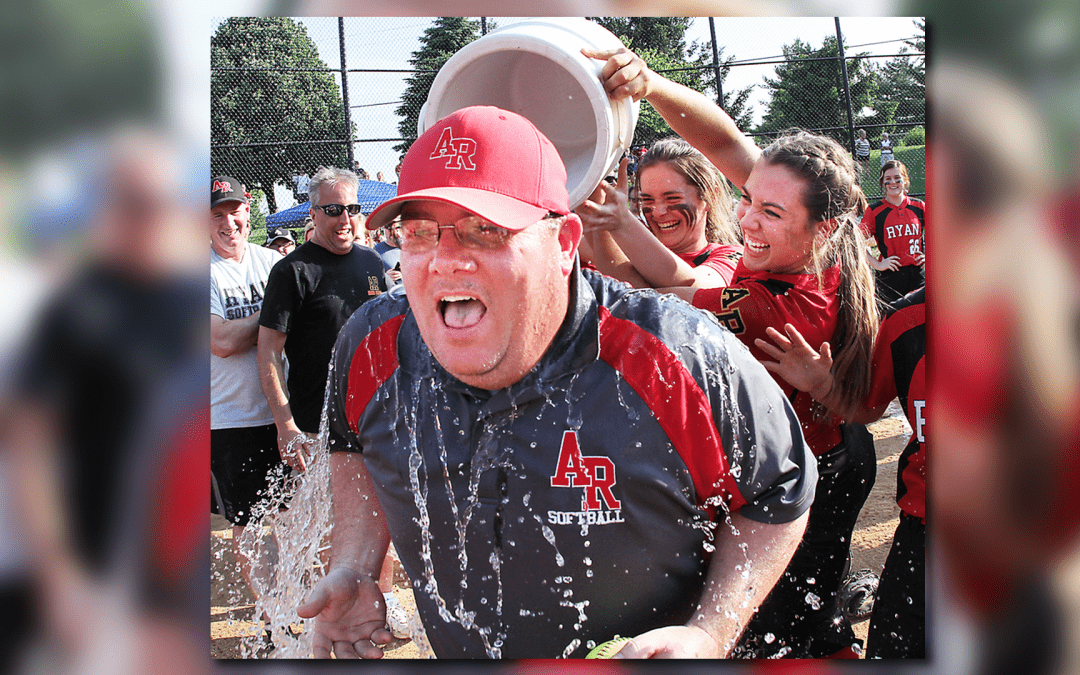
Dec 4, 2018 | Coach Profiles, Softball, The Best Stories
John Kidwell
Head Softball Coach
Archbishop Ryan High School
Philadelphia
As a coach, we all take chances. We move our slumping clean-up hitter to seventh and she knocks it out of the park. We switch our short stop to second and she turns an incredible double play. We trust a player to steal home and we win the game. We take chances that make our players shine, propel us to victories and make us, as coaches, look good.
Or, we take a chance in the semifinals, by starting a freshman pitcher over the sophomore who beat the same team during the regular season. And, we lose the game, remembering it as one of our all-time coaching disasters.
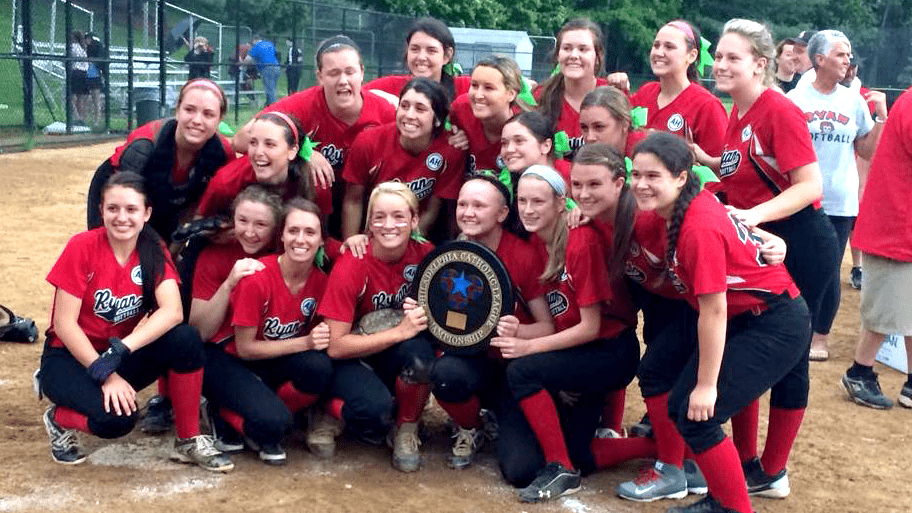
2014 PCL Champions
But, coaching has incredible highs. Like winning the Catholic League Championship in 2014 for the first time since 1995, in the same season that we lost a long-time, beloved coach. What a tremendous feeling it was to win that title, not just for the team, but for the coach we lost. And, the pride of knowing that winning four out of five league championships has just as much to do with chemistry and ego-checking than talent.
Growing up I had two younger sisters who played softball. I spent a lot of time watching them play and figuring out the game. By the time I got to college, I knew for sure I wanted to be a coach.
I landed the head junior varsity coaching position at Archbishop Ryan in 1992. In 1997, I was promoted to varsity as an assistant coach and in 2014 was named softball’s head coach after Andy Hafele passed away.
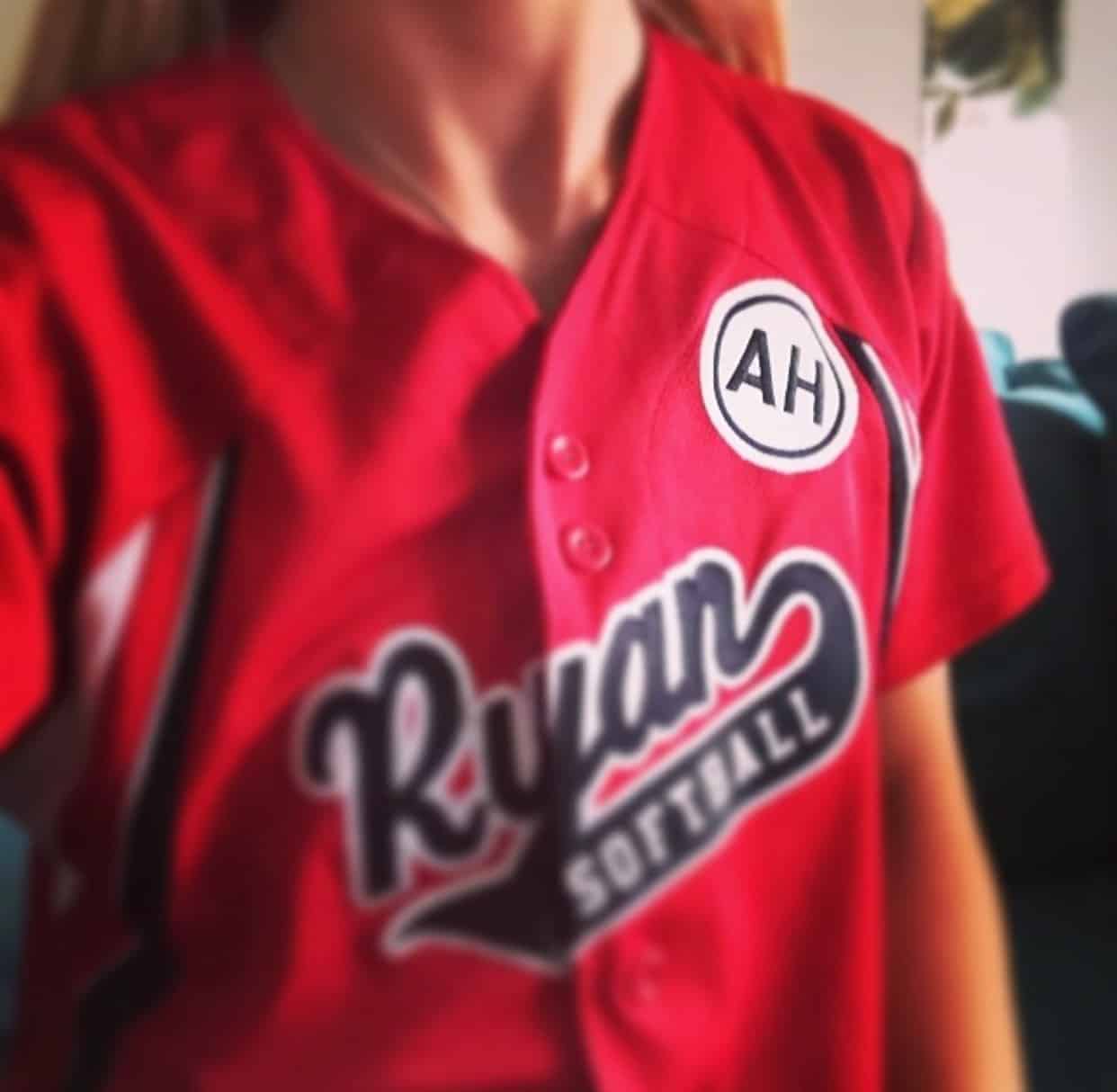
Patches worn during the 2014 season in remembrance of Andy Hafele
Andy and I coached together for 22 years. He was not only my mentor, but a huge influence on the coach I’ve become. He taught me how to run a program and how to establish a winning culture. Andy’s presence on the field is felt to this day and I can’t help but feel he is a big reason for our recent success.
I think about Andy when I consider the impact I have on my players and work hard on building the same respect and trust that he did. Our players are only with us for four years, but the physical and emotional transformations we witness from freshman to senior year is absolutely awesome. By the time they graduate from Archbishop Ryan and head off to college, they are ready for the world. It gives me great joy to know that I, through the game of softball, was able to help shape these players into the incredible young women they’ve become.

Andy Hafele Memorial Softball Field, Archbishop Ryan High School, Philadelphia, PA
In keeping with the tradition that Be the Best is a convention created for coaches by coaches, we’ve asked for inspirations and stories from your contemporaries. Click here to share something about your coaching journey. Don’t worry about making it sound good — you coach the kids, we‘ll work the words.
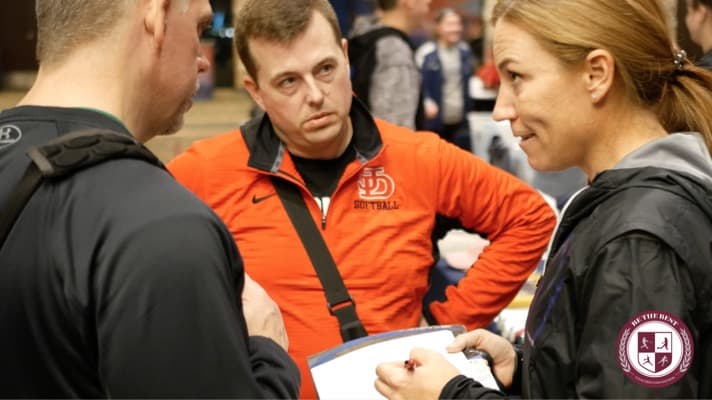
Nov 20, 2018 | Baseball, Softball
Coaches coach for many different reasons. Some want to give back. To the game, to the community, to the people who helped them along the way. Others are motivated by the thrill of competition, the emotion of the game and the camaraderie of the team. And some want to propel their players to the next level, watch them succeed and have a positive impact on their lives.
But the bottom line is, coaches coach because it’s fun.
And that’s why Be the Best adds FUN to the line-up.
Ask anyone who’s ever been to the convention. It’s not about listening to lectures from top college and professional coaches. It’s not about one-sided dialogues and technical presentations. What makes Be the Best so great is the natural interaction, the candid discussions and the back-and-forth sharing of skills, ideas and stories.
You may find yourself exchanging emails with one of the most celebrated coaches in college softball, drinking a beer with an MLB coach or chatting over coffee with a professional player. Be the Best speakers remember when they, too, were making their way in the baseball and softball worlds and genuinely want to do what they can to enhance your personal journey.
Don’t miss the ball on this one. We promise that Be the Best is more than instructive. More than informative. It’s down-right fun!
Registration is open NOW!
Baseball Coaches’ Convention
Thursday, January 10 – Saturday, January 12
Make your hotel reservations NOW!
Softball Coaches’ Convention
Thursday, January 17 – Saturday, January 19
Make your hotel reservations NOW!

May 29, 2018 | Guest Posts, Softball
MYTHS
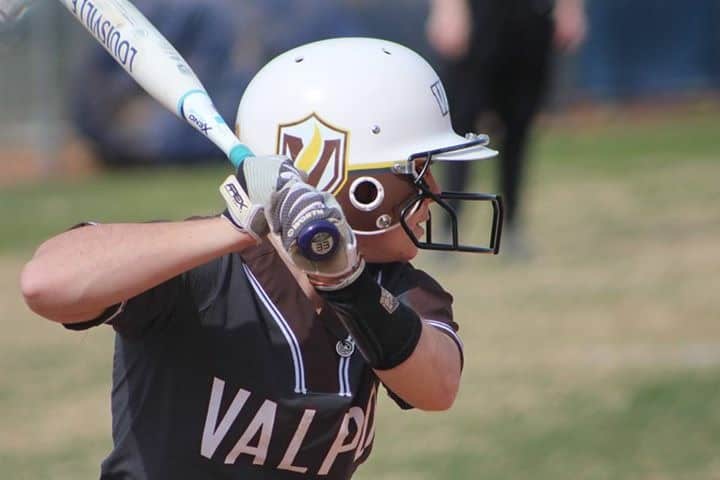 IF YOU DON’T PLAY DIVISION I, YOU HAVEN’T REALLY REACHED YOUR GOAL
IF YOU DON’T PLAY DIVISION I, YOU HAVEN’T REALLY REACHED YOUR GOAL
No. Stop.
I am a Division I softball coach. It doesn’t mean I’m a better coach than my colleagues in Division II. It doesn’t mean that my wins and losses are more relevant than theirs, or that I’m higher on my climb up the ladder than them. Division II isn’t the JV version of Division I. It doesn’t work that way. And you haven’t come up short on your goal if you play ball at a school that competes in something other than NCAA Division I. Really. No matter where you play, you join a team that spends all year sweating and grinding together. Laughing together. Picking each other up and pushing each other further. Becoming a family. And when you win a championship and dogpile on home plate with that family…it doesn’t matter what Division you are. Winning is winning, and family is family, no matter what the Division.
IF YOU HAVEN’T COMMITTED BY JUNIOR YEAR, YOU’RE OUT OF LUCK
No.
Even the biggest Division I softball programs may have money available into your junior or senior year. As y’all are well-aware, players are committing at younger and younger ages. So, yes, it feels like you’re way behind when you see kids not yet in high school committed to a college. But those early commitments have created a trickle-down effect that make uncommitted juniors and seniors more desirable: There are plenty of kids who commit early and whose priorities change as they grow up, and the result is they decommit later into their high school career, leaving a hole in that particular college’s recruiting class, and opening up new opportunities for uncommitted athletes.
But on top of that, even without decommitments, many schools at all divisions still have money for juniors. We recognize the importance of watching someone grow in maturity, skill and strength before offering them a spot on our team. So if you’re currently a 2020 and you haven’t committed yet…take a deep breath. There are many opportunities still out there.
IF YOU DON’T THROW 60 MPH, YOU CANNOT PITCH AT THE DIVISION I LEVEL
No.
We face plenty of successful pitchers throughout our season that do not throw 60 MPH. Some pitching coaches or programs may want their pitchers to throw over a certain velocity. If that velocity is 60 MPH and you don’t throw that hard…well, then that’s not the program for you. But there are many Division I softball programs who have pitchers throwing under 60 MPH and finding a good deal of success. You don’t have to throw 60 MPH to play Division I softball.
YOU’RE TOO SMALL TO PLAY DIVISION I
No.
Have you heard of the University of Alabama? You may have seen them at the World Series. A few years ago they had an incredible third baseman named Kelley Montalvo who I’m not sure topped out at five feet tall. And that was at one of the best softball programs in the country! At the mid-major level, we see a lot of undersized players doing oversized things on the field. Some programs may want their players to be a certain size. If that size is bigger than you…well, then that’s not the program for you. But there are many Division I softball programs who have players considered small. You can be small in stature and play Division I softball.
TRUTHS
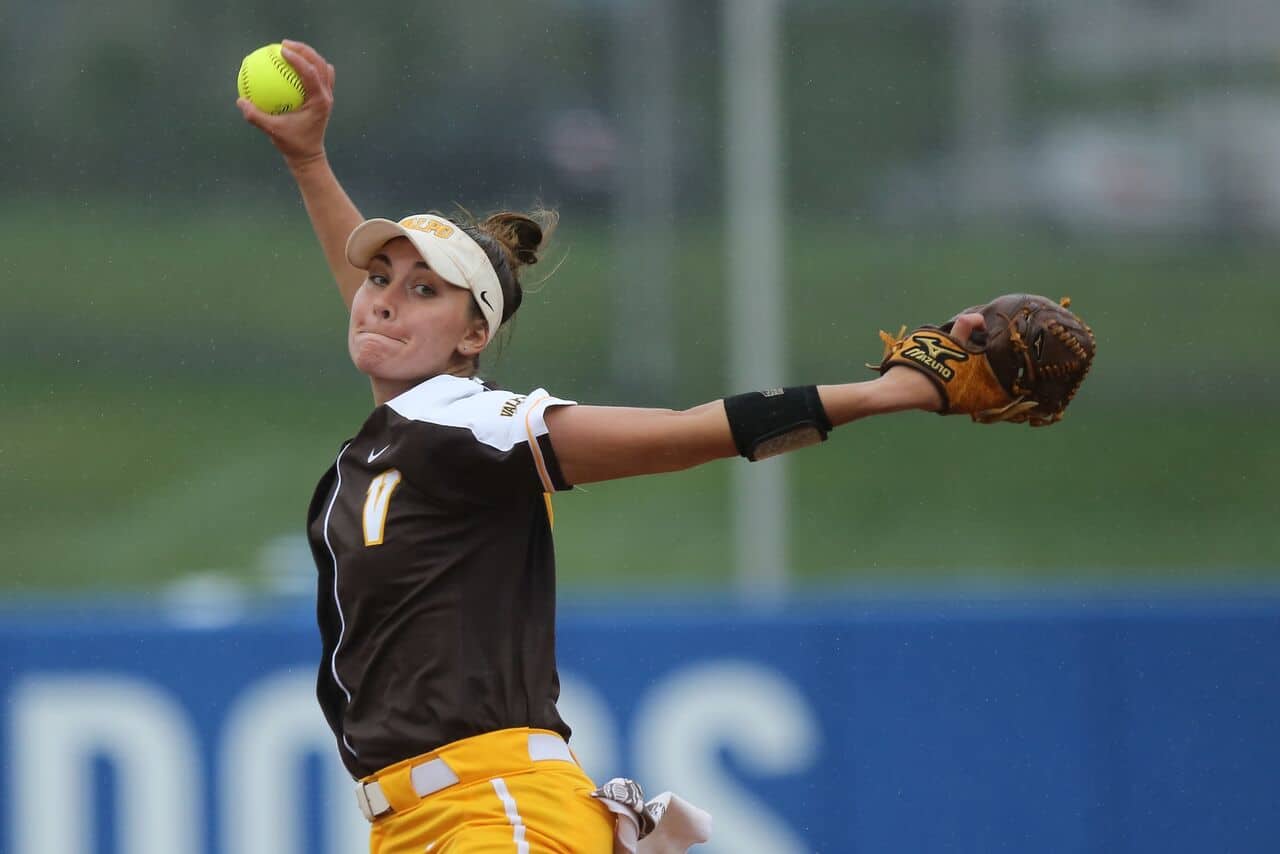 WE HAVE STOP WATCHES & RADAR GUNS
WE HAVE STOP WATCHES & RADAR GUNS
Be honest about your pop time, your home-to-first time, and your pitching velocity. We have stopwatches and we have radar guns, and we pull them out all the time to make sure we have an accurate read on your abilities.
EXAGGERATING YOUR POP TIME IS DIFFERENT THAN EXAGGERATING YOUR GPA
Speaking of honesty; we get a lot of emails with inaccurate pop times or home to first times. I’m not a fan of that, but I understand it. If ever you threw a 1.68 even though you typically throw about a 1.8, I understand you putting down your best ever time. And when we come see you play, like I said above, we’ll get our own read on that.
However, you cannot exaggerate your GPA. You cannot put your most recent semester’s GPA on your profile sheet and misrepresent it as your cumulative GPA. We need your real, cumulative GPA. This information is imperative for us to assess your ability to get into the school and, once here, to be successful academically. If you have a 2.8, you can’t round up; it doesn’t work that way.
COLLEGE COACHES TALK TO OTHER COLLEGE COACHES
We share information about you guys with each other. This happens a lot. If, for instance, a colleague of mine is looking for a 2020 catcher and I’m not, I’ll share info with them on players I know who might fit the bill. If we are at the same tournament, I’ll text that coach if I see a good catcher on the field I’m watching. I’ll send video. I might even ask the team’s recruiting coordinator about them. Yes, we are rivals on the field and we don’t share all the secrets to our trade…but college coaches are also a cooperative group. Recruiting is expansive and not only are we good at helping each other, but when one of you makes a great impression on us but we just don’t have the spot, we’re also good at trying to help you by passing your name along to each other.
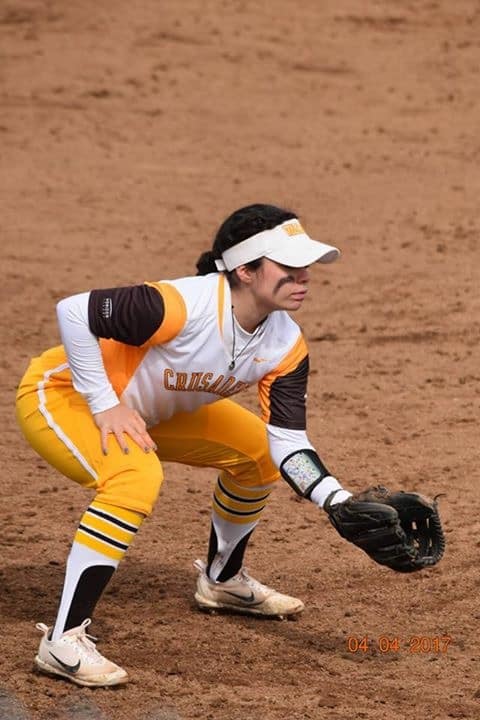 SKILL & CHARACTER
SKILL & CHARACTER
I’ll take character over skill every day. I was given a really good piece of advice about recruiting “questionable” players that I will share with you. I was told that if I found an incredible athlete with questionable character, I could do one of two things: If I passed on them, they’d go to a rival school and might help beat my team once or twice a year. But if I brought them on with that questionable character, then that person could beat us every day for four years. Our culture is the backbone of our decision-making process, and because of that we care just as much about how you treat your teammates as how hard you can hit a ball.
With that said, here are some things we do to evaluate your character. We watch you in the dugout. We watch to see how you head out to your position. We watch to see how you react to your own successes and failures, and those of your teammates. We hear your conversations with teammates while we walk behind you heading to our next field. We see what you post on Twitter and what you retweet. We pay attention to how you interact with your coaches and your parents, because we’ll be spending four years with you. We have a program to grow. We have 18-20 players who are counting on us to bring in people who fit into our family and who contribute positively both on and off the field. And we take that responsibility seriously.
So there you have it. A couple myths and a couple truths about the recruiting process. The best advice I can give is to be honest with yourself about your abilities and about what constitutes a fit for you as it pertains to your softball & academic careers and to your overall well-being. And, lastly, I encourage you to focus on the pleasure of playing ball. I can’t imagine the pressure you must feel in the recruiting landscape today, and I hope that you don’t let the college coaches behind the fences eclipse the joy of the competition and camaraderie you have between the lines. Best of luck!
This article written by Valparaiso University’s Head Softball Coach, Kate Stake was previously published in Top Recruit Magazine.
Kate Stake has been Head Softball Coach at Valparaiso University since 2014. She led the team to the Horizon League Championship as well as a to a berth in the NCAA Tournament in her second year at the helm. Prior to arriving at Valpo, Stake spent two seasons on the coaching staff working under NFCA Hall of Fame head coach Bill Edwards, three seasons as assistant coach at the United States Military Academy and three years at Eastern Illinois. Stake earned a bachelor’s degree in English Education from Illinois State and a master’s in kinesiology and sports studies from Eastern Illinois.
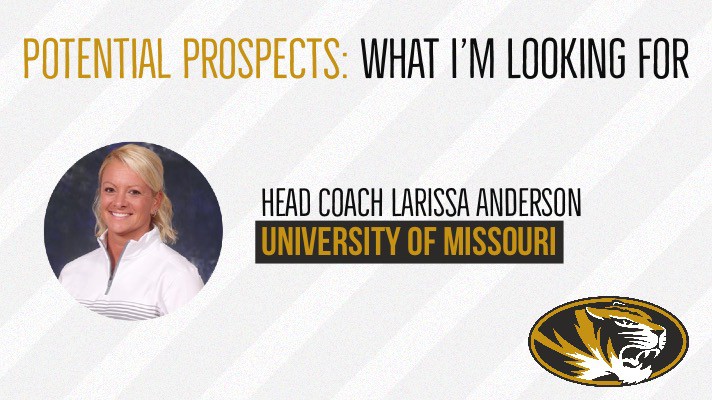
May 24, 2018 | Guest Posts, Softball
What I’m looking for in Potential Prospects
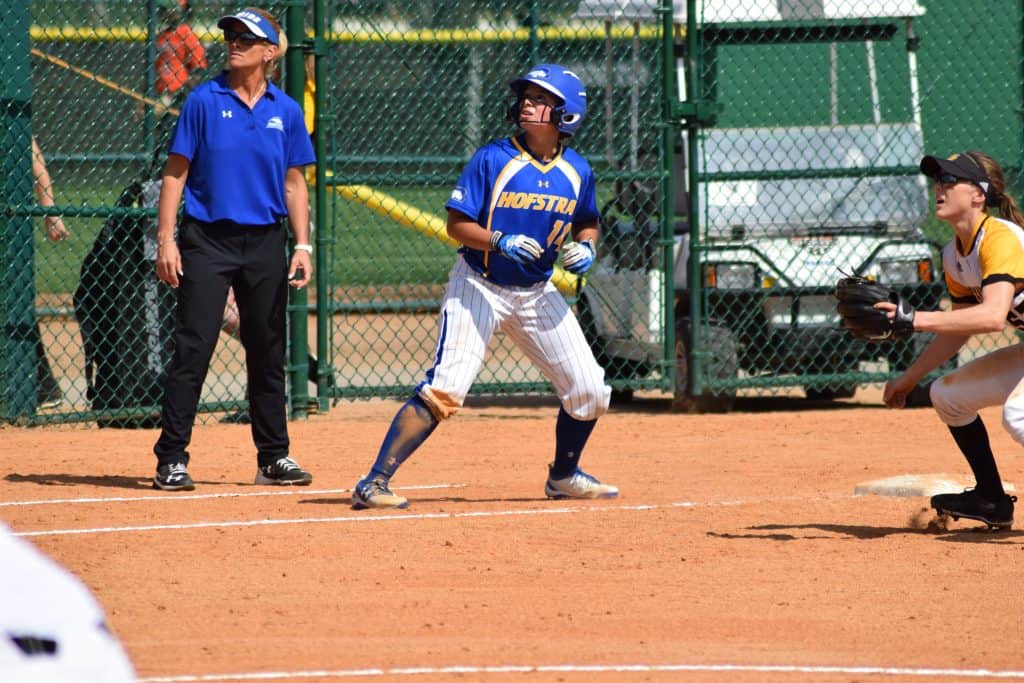 #1 – Fierce Competitor, Self-Motivated, Self-Disciplined! I want to see someone compete on and off the field, in the batter’s box and in the class room. Someone who works hard on every play, dives, supports their teammates, carries their own bag, takes challenging courses in high school and wants to win.
#1 – Fierce Competitor, Self-Motivated, Self-Disciplined! I want to see someone compete on and off the field, in the batter’s box and in the class room. Someone who works hard on every play, dives, supports their teammates, carries their own bag, takes challenging courses in high school and wants to win.
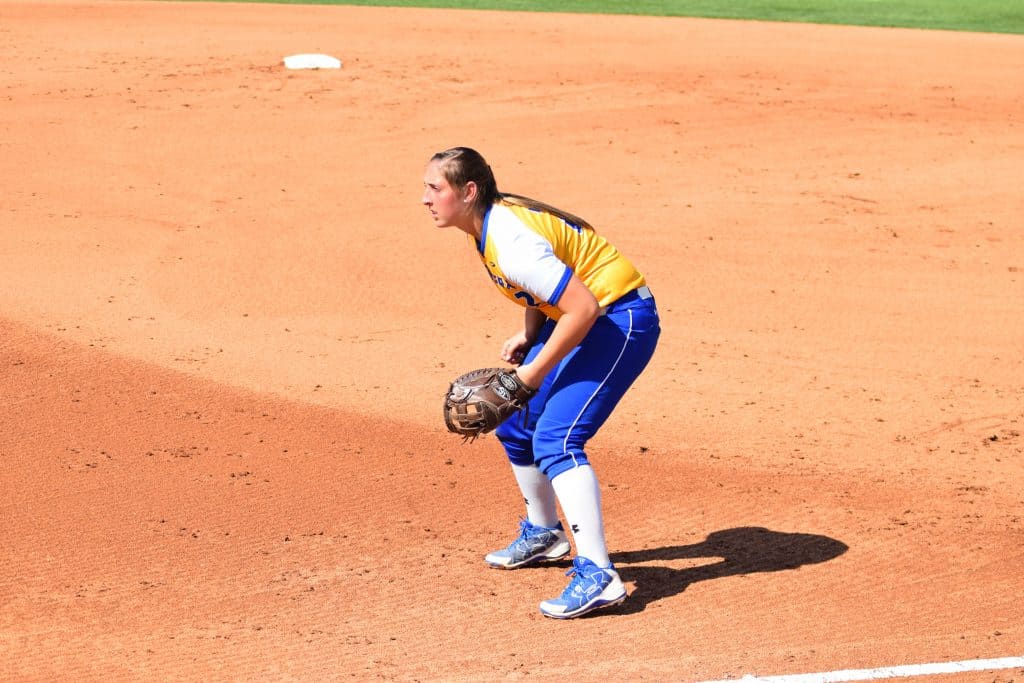 #2 – Upside Potential. When you can teach every aspect of the game, you look at a future prospect and evaluate them and say, “how can I make this player better? Will she be just as good if not better than what I currently have on the team?” If the prospect has one of the 5 tools that is at the Division 1 level, (1-Running Speed, 2-Arm Strength, 3-Hit for Average, 4-Hit for Power, 5-Fielding), what is the potential of the other tools? If she has more than one of the five tools, then you must develop the other tools. If she has all five tools at the Division 1 level, then she’s a blue chip prospect.
#2 – Upside Potential. When you can teach every aspect of the game, you look at a future prospect and evaluate them and say, “how can I make this player better? Will she be just as good if not better than what I currently have on the team?” If the prospect has one of the 5 tools that is at the Division 1 level, (1-Running Speed, 2-Arm Strength, 3-Hit for Average, 4-Hit for Power, 5-Fielding), what is the potential of the other tools? If she has more than one of the five tools, then you must develop the other tools. If she has all five tools at the Division 1 level, then she’s a blue chip prospect.
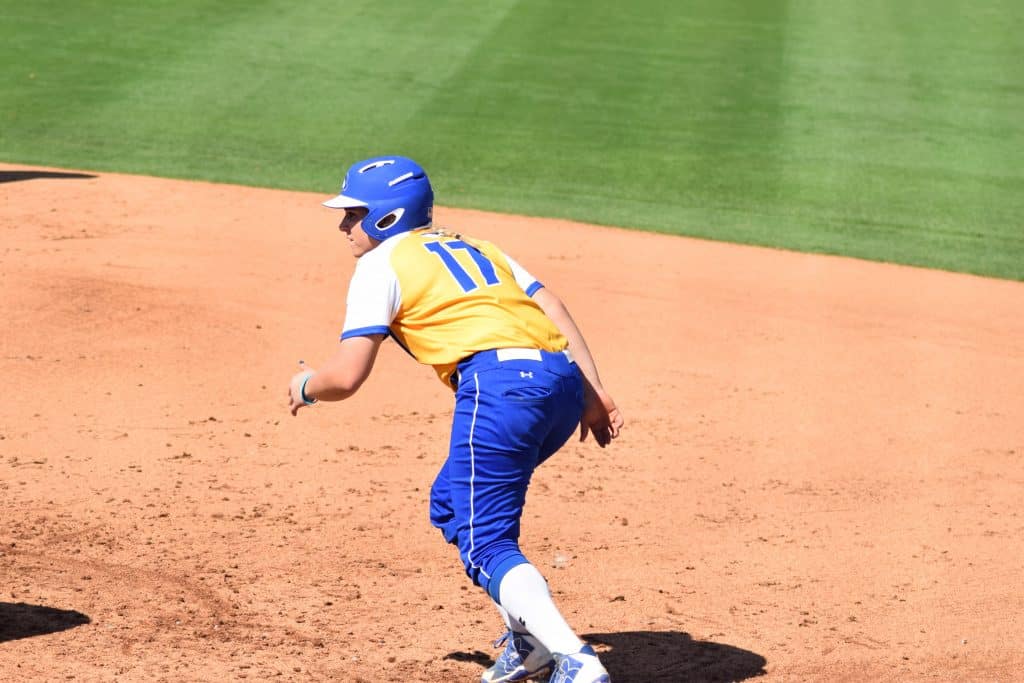 #3 – I want a prospect to want to play for me and want to play for my university. I don’t want to have to sell a kid to come to my school. I want her to recruit me as much as I want to recruit her. Then I know she wants to be a part of our family and is making a decision for the right reasons. Not because someone else is telling her to, not because of the scholarship offer, not because of the conference. Because she wants this to be her home for the next four years and to be a part of our family for the rest of her life.
#3 – I want a prospect to want to play for me and want to play for my university. I don’t want to have to sell a kid to come to my school. I want her to recruit me as much as I want to recruit her. Then I know she wants to be a part of our family and is making a decision for the right reasons. Not because someone else is telling her to, not because of the scholarship offer, not because of the conference. Because she wants this to be her home for the next four years and to be a part of our family for the rest of her life.
Larissa Anderson was named Head Softball Coach at University of Missouri after the 2018 season, having been Hofstra University’s Head Softball Coach since 2015. Before taking over at Hofstra, Anderson spent the previous 13 seasons on the university’s staff as an assistant; the last 10 as the associate head coach. She was just the sixth head coach in program history since 1980 and took over for Hall-of-Fame coach Bill Edwards, who helmed the program from 1990 through 2014.
Anderson led Hofstra to the Colonial Athletic Association championship and a NCAA Tournament berth in her first season as the program’s head coach in 2015, guiding Hofstra to a 38-14-1 record and a spot in the NCAA Gainesville Regional. She and her assistants were named the NFCA Northeast Region’s Coaching Staff of the Year. As a nationally-recognized coach, Anderson frequently speaks at camps and clinics across the country.
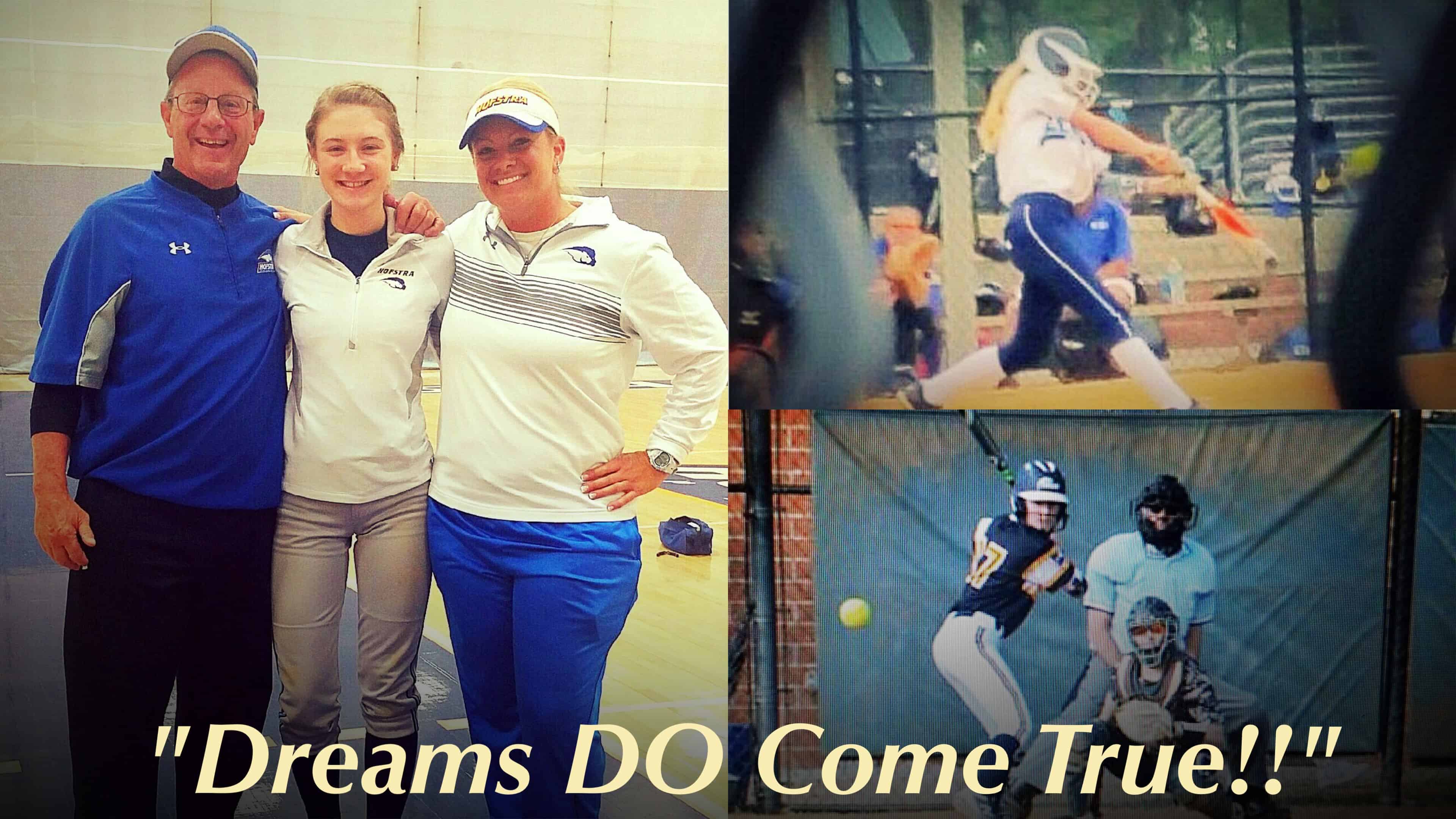
Dec 15, 2016 | Be The Best News, The Best Stories
Everyone’s got a story when it comes to the sport they love. How they got started. Who got them motivated. What road they took to pursue their dreams. And when Be the Best plays a part in someone’s story, we know we’ve done our job.
Here’s the story of Jaycee Ruberti and how attending Be the Best Coaches’ Convention at ten years-old framed her future to become a collegiate softball player at Hofstra University.
I have played softball for as long as I can remember. And for most of that time, I dreamed of playing for Hofstra University. When I was 10 years-old, I accompanied my dad to Be the Best Clinic in Cherry Hill, New Jersey. We went from class to class, learning the different aspects of the game taught by college coaches from all over the country.
I had the good fortune of attending a session taught by Bill Edwards who, at the time, was the head softball coach at Hofstra. His instructional lecture was the most powerful and exciting I had ever heard. I asked my dad to revise my schedule so we could attend every one of Coach Edwards’ sessions.
I WAS HOOKED!
Coach Edwards made two statements that I have never forgotten. The first was, “College coaches are looking for good people, not just good athletes.” And, because I’m an outfielder, the second statement was particularly relevant. “There’s not always a correct way to catch every single ball that’s hit. JUST CATCH IT!”
From that day on, playing at Hofstra became my dream.
As my softball career continued and the recruitment process began, I became even more determined to play at Hofstra. I started receiving interest and offers my freshman year of high school but was not willing to accept any offers until Coach Anderson (Hofstra’s new head coach) had an opportunity to see me play at least once.
In June of 2015, Coach Anderson showed up at a Team New Jersey tournament. After watching me play three consecutive games, I was invited to visit Hofstra University the following weekend. On that visit, Coach Anderson offered me a position on the 2018 Hofstra softball team.
My dream started at Be the Best and I know now that dreams do come true — with God, hard work and determination!
Thank you, Jaycee, for sharing your story. We wish you nothing but The Best, as a player and a person!
If YOU have a story about Be the Best, let us know!
Just click here, fill out the form and we’ll be sure to share it!







 IF YOU DON’T PLAY DIVISION I, YOU HAVEN’T REALLY REACHED YOUR GOAL
IF YOU DON’T PLAY DIVISION I, YOU HAVEN’T REALLY REACHED YOUR GOAL WE HAVE STOP WATCHES & RADAR GUNS
WE HAVE STOP WATCHES & RADAR GUNS SKILL & CHARACTER
SKILL & CHARACTER
 #1 – Fierce Competitor, Self-Motivated, Self-Disciplined! I want to see someone compete on and off the field, in the batter’s box and in the class room. Someone who works hard on every play, dives, supports their teammates, carries their own bag, takes challenging courses in high school and wants to win.
#1 – Fierce Competitor, Self-Motivated, Self-Disciplined! I want to see someone compete on and off the field, in the batter’s box and in the class room. Someone who works hard on every play, dives, supports their teammates, carries their own bag, takes challenging courses in high school and wants to win. #2 – Upside Potential. When you can teach every aspect of the game, you look at a future prospect and evaluate them and say, “how can I make this player better? Will she be just as good if not better than what I currently have on the team?” If the prospect has one of the 5 tools that is at the Division 1 level, (1-Running Speed, 2-Arm Strength, 3-Hit for Average, 4-Hit for Power, 5-Fielding), what is the potential of the other tools? If she has more than one of the five tools, then you must develop the other tools. If she has all five tools at the Division 1 level, then she’s a blue chip prospect.
#2 – Upside Potential. When you can teach every aspect of the game, you look at a future prospect and evaluate them and say, “how can I make this player better? Will she be just as good if not better than what I currently have on the team?” If the prospect has one of the 5 tools that is at the Division 1 level, (1-Running Speed, 2-Arm Strength, 3-Hit for Average, 4-Hit for Power, 5-Fielding), what is the potential of the other tools? If she has more than one of the five tools, then you must develop the other tools. If she has all five tools at the Division 1 level, then she’s a blue chip prospect. #3 – I want a prospect to want to play for me and want to play for my university. I don’t want to have to sell a kid to come to my school. I want her to recruit me as much as I want to recruit her. Then I know she wants to be a part of our family and is making a decision for the right reasons. Not because someone else is telling her to, not because of the scholarship offer, not because of the conference. Because she wants this to be her home for the next four years and to be a part of our family for the rest of her life.
#3 – I want a prospect to want to play for me and want to play for my university. I don’t want to have to sell a kid to come to my school. I want her to recruit me as much as I want to recruit her. Then I know she wants to be a part of our family and is making a decision for the right reasons. Not because someone else is telling her to, not because of the scholarship offer, not because of the conference. Because she wants this to be her home for the next four years and to be a part of our family for the rest of her life.